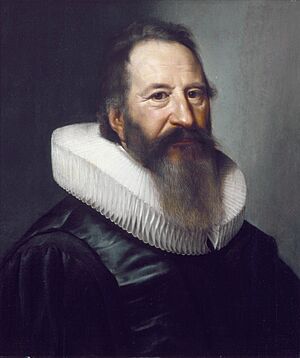Gerardus Vossius facts for kids
Gerrit Janszoon Vos (born March or April 1577 in Heidelberg, died March 19, 1649 in Amsterdam), often called Gerardus Vossius (his Latin name), was a famous Dutch scholar. He studied and taught about old languages, history, and religion. He was known for his wide knowledge and his many important books.
Life of Gerardus Vossius
Gerrit's father, Johannes Vos, was a Protestant from the Netherlands. He had to leave his home because of religious problems. He became a pastor near Heidelberg, where Gerrit was born. Later, his family moved to Dordrecht, where Gerrit grew up.
In 1595, Gerrit started studying at the University of Leiden. There, he became good friends with Hugo Grotius, another famous scholar. Gerrit studied many subjects, including old languages like Latin and Hebrew, church history, and theology (the study of religious beliefs).
In 1600, he became the head teacher (rector) of the Latin school in Dordrecht. He spent his time studying philology (the study of language in historical sources) and church history. From 1614 to 1619, he was in charge of the religious college at Leiden University.
Gerardus Vossius became very well-known as a scholar, not just in the Netherlands but also in France and England. Even though he tried to avoid arguments, some people thought his ideas were wrong. He had written a book called Historia Pelagiana, which was about old religious debates. Some believed it supported the views of the Arminians, a religious group. To avoid being removed from his job, he decided to resign in 1619.
In 1622, he was made a professor at the university. He taught rhetoric (the art of speaking or writing effectively) and Greek. He had many friends and contacts in England. He even received an offer from Archbishop Laud to join the Canterbury Cathedral. He went to England in 1629 and received a special degree from Oxford University. He was friends with many important people, including Thomas Farnaby, whose Latin grammar book was partly based on Vossius's work.
In 1632, Vossius left Leiden. He became a professor of history at the new Athenaeum Illustre in Amsterdam. He taught there until he passed away.
Vossius Family
Gerardus Vossius had several sons who also became scholars:
- His son Isaac Vossius (1618–1689) became a scholar in Sweden. Later, he worked at Windsor in England. He wrote books about ancient texts and music.
- His son Dionysius Vossius helped with notes on the works of a famous Jewish scholar named Moses Maimonides.
- His third son, Gerrit Vossius, edited a book by an ancient Roman writer named Velleius Paterculus.
- His son Matthew wrote a history book about Holland.
- Gerardus Vossius also had a brother named Francis Vossius.
Important Works
Gerardus Vossius was one of the first scholars to study religious beliefs and non-Christian religions in a scientific and historical way, rather than just from a religious viewpoint. His most important books include:
- Historiae de controversiis quas Pelagius eiusque reliquiae moverunt (1618) - This book was about religious arguments from the past.
- Aristarchus, sive de arte grammatica (1635) - A book about grammar.
- Etymologicum linguae Latinae (1662) - This book explored the origins of Latin words.
- Commentariorum Rhetoricorum oratoriarum institutionum Libri VI. (1606) - A book about the art of public speaking and writing.
- De Historicis Graecis Libri IV (1624) - About Greek historians.
- De Historicis Latinis Libri III (1627) - About Latin historians.
- Of Errors of Speech and Latino-Barbarous Terms (1640) - About mistakes in language.
- De Theologia Gentili (1641) - About the religions of non-Christian people.
- Dissertationes Tres de Tribus Symbolis, Apostolico, Athanasiano et Constantinopolitano (1642) - About important Christian creeds.
- The Times of the Ancient Poets (1654) - About poets from ancient times.
- Correspondence of Vossius with Eminent Men (1691) - A collection of his letters with other important people.
His collected works were published in Amsterdam between 1695 and 1701. His books on rhetoric were very popular and used as textbooks for a long time. He followed the ideas of ancient thinkers like Aristotle and Cicero in his work.


